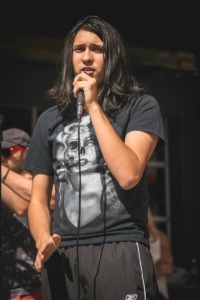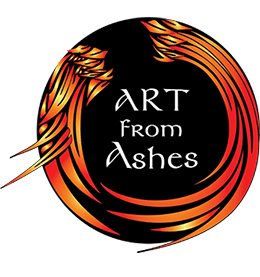 Interview by Michael McLoughlin
Interview by Michael McLoughlin
[popup_trigger id=”8123″ tag=”button”]En Español[/popup_trigger]
MICHAEL (M): Can you tell me how you first came in contact with Art from Ashes?
ZAYA (Z): I was in an entirely different program called the Youth Advocate Program, for kids that were really struggling in life, whether with their own emotions or with family. They take you out to different places, and one of the places was here. I remember when I first discovered it, we came every Wednesday, and it was definitely one of the better experiences I’ve had in my life. So, you know, I’m always happy to be here.
M: How much of a connection have you had with Art from Ashes?
Z: It’s definitely one of the deeper connections I’ve ever had. That’s why I love it so much. You know, in my day to day life, there’s not a lot of people I can really turn to, but this is one of the places where I can always come, and I can actually speak my voice because I’m very scared to even speak my voice. Here, I get to do it metaphorically, so that way, I get to really discuss things and really get to connect with people in a way that’s really inspiring, I think.
M: Before finding Art from Ashes, how much connection did you have with art and poetry?
Z: I definitely had a connection. I still talk to the Youth Advocate, because she was one of the big connections that I’ve had with somebody, and one of the brighter experiences that I’ve had. I just try to hold onto those things because they are very rare. I think when they do come, those kinds of connections, I want to cherish them.
M: You said you feel like this is a place where you can express your voice, but you can’t in other places. Tell me about how you could tell that was happening as you started to come to Art from Ashes more.
Z: I’ve noticed a major difference in my day-to-day life. Like this feels more like my home than my actual home. And it’s because people always wanted me to be silent. If I ever said anything, then it was always like, I got in trouble, or I got yelled at, or whatever else they wanted to do to me. But here, I remember that I wrote my poem, and they wanted me to talk. They told me, “We want you to go on the mic and say what you wrote.” It was crazy, like nobody ever really asked me to talk, you know? Nobody ever wanted to hear me, but they actually wanted to hear, and so I read, and it was one of the most relieving moments I’ve ever had. It was peace. And like, I finally felt like I actually mattered to somebody. People say all the time, “Well, you mean a lot to me,” or “I love you the best,” but their actions say otherwise. They don’t actually want to listen to you. This is different. They say that they love you here, but they do it through actions. And they encourage you to talk, encourage others to listen, and encourage everyone to respect that voice of each other. That’s really real, I think.
M: Do you have an example of some metaphors you have used in your poems?
Z: Yes, An experience I don’t really talk about a lot—because you know, most people don’t want to talk about it because they feel uncomfortable—is that when I was younger, I was being abused. But here, I got to talk about it. People really connected with what I was saying so I use a metaphor, sometimes like the bogey man, or like the ocean, you know. It’s like making the boat rock, and it’s trying to drown you, or like a storm or something like that. That’s what I really refer to them as. You know, I don’t actually call them that, and I don’t… it’s hard for me to say, because people don’t know what you’re talking about, but they understand. They don’t get that it was about the abuse that I went through when I was younger. They didn’t actually know it logically. Literally, they knew it was more emotional, like they felt it.
M: How do you think that is going to affect things as you go forward?
Z: I already definitely noticed a change, you can even see it in me. Like say you met me before I started to come to Art from Ashes and you wanted to do an interview, I’d probably say no, and I’d be very vague and I wouldn’t want to say anything, you know? It’s encouraged me to speak out, to be brave, and to let myself be, you know, not 100%. I’m still working on things. Like I’m connecting with people now and before I didn’t really have anybody, you know? It’s definitely moving forward, I think I’ll continue to see that. I’ll continue to see more courage, more bravery, more openness and hope. Because it’s growing every day, you know?
M: That sounds like that’s quite an advancement from not wanting to talk. How are you going to move forward with these projects?
Z: I’m definitely going to keep writing, and I’m going to just keep making more music, more albums. Definitely get things done one at a time, and also go to school and get a college education and just put creativity and hope into everything I do.
M: Did you see yourself having a college plan like that before you were involved with either the Youth Advocate Program or Art from Ashes?
Z: I had a very vague idea of what I wanted to do. I wanted to try everything. Because anything that was outside of being controlled or abused or bullied felt like freedom. I didn’t have an exact plan, but this honestly helped me to think more logically. I am a lot less impulsive, I really like to weigh things out.
M: And now you feel like you can have a voice when you haven’t before.
Z: Definitely, yeah. I really thank them for that, you know. I don’t know if I would have been… I was really silent at one point, but this really made me want to talk.
Read Zaya’s poems written in 3 minutes at our Phoenix Rising workshop:
[popup_trigger id=”8263″ tag=”button”]Clear by Zaya[/popup_trigger]
[popup_trigger id=”8268″ tag=”button”]My Wild Precious Life by Zaya[/popup_trigger]


